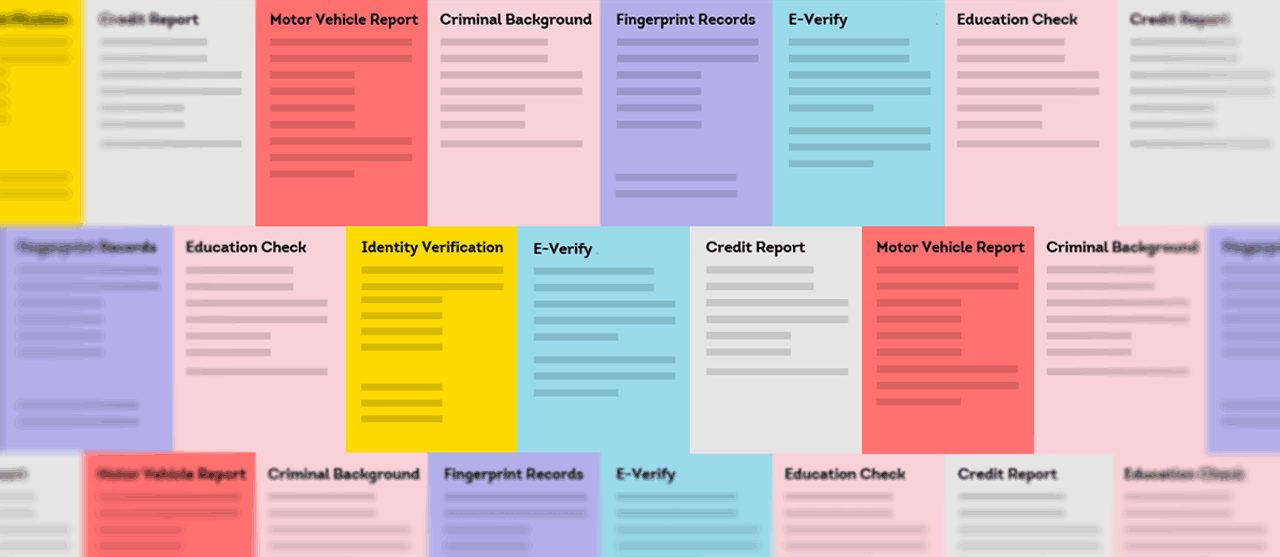Sudden customer growth may mean complete disaster for unprepared small business owners. For success when hiring temporary workers, it is helpful to write clear effective job expectations, hire early, keep great records, conduct exit interviews, and screen them like permanent employees.
Disclosure: This content, except as otherwise indicated or stated on this site, is the property of TransUnion Rental Screening Solutions, Inc. This content is for educational purposes and for convenience only. Trademarks used are the property of their respective owners, and no endorsement or affiliation is implied. The information presented in this content is “as is” without warranties of any kind, and specifically is not represented to be complete and does not constitute legal advice, and is subject to change without notice. You are encouraged to check these terms from time to time for changes, and by accessing this site you agree to these terms and all terms listed. Laws and regulations may vary by state and locality. Consult your own counsel if you have legal questions related to your rental property practices and processes.
Disclaimer: Remember that this material is intended to provide you with helpful information and is not to be relied upon to make decisions, nor is this material intended to be or construed as legal advice. You are encouraged to consult your legal counsel for advice on your specific business operations and responsibilities under applicable law. Trademarks used in this material are the property of their respective owners and no affiliation or endorsement is implied.
As reliable as tulips poking up from the ground, spring brings people back to stores and businesses. However, while flowers signal pleasant days to come, sudden customer growth may mean complete disaster for unprepared small business owners.
Long lines, dwindling stock, insufficient staff to meet client needs—these are just some of the common pitfalls that you might face if you’re not prepared for the inevitable influx. While you might operate with a lean staff at other times, a spring or winter sales uptick could mean hiring temporary workers to keep up with seasonal demand.
The Affordable Care Act (ACA) defines a seasonal employee as “an employee who is hired into a position for which the customary annual employment is six months or less.” Temporary employees can be a cost-efficient solution to help small businesses remain productive and profitable during times of peak demand—without sacrificing the quality of products or services.
Additionally, seasonal hiring is not limited only to spring. Some companies supplement their staff during any period of increased traffic, such as the holiday season. Others, such as summer camps, rely solely on seasonal employees.
Today, temporary workers make up a significant portion of the workforce. According to The American Staffing Association, in any given week about 2.4 million temporary employees and contractors work across a variety of industries, including:
- Hospitality
- Customer Service
- Retail
- Tax
- Education
- Travel
However, while there are many benefits, hiring temporary employees can potentially be dangerous. Inviting a swarm of strangers into your business without proper vetting—even for a short time—could lead to losing customers due to inappropriate behavior, negligence lawsuits, and more.
Regardless of the planned length of their employment, it's imperative to vet all staff through a well-established pre-employment screening service like ShareAble for Hires®. Cutting corners during hiring by overlooking background checks could mean watching your potential growth wither and die.
These tips can help you understand your options and considerations when taking on seasonal hires, whether to prepare for the holiday rush or to supplement your staff during other times of the year.
Here’s what it includes:
With these hiring tips you’ll hopefully onboard a stronger staff––no matter the season.
The Benefits of Hiring Seasonal Employees
Whether you need holiday workers or need to build your team for a busy spring and summer, seasonal employees may provide several benefits.
Note: Always consult legal counsel to help comply with variations in your local laws.
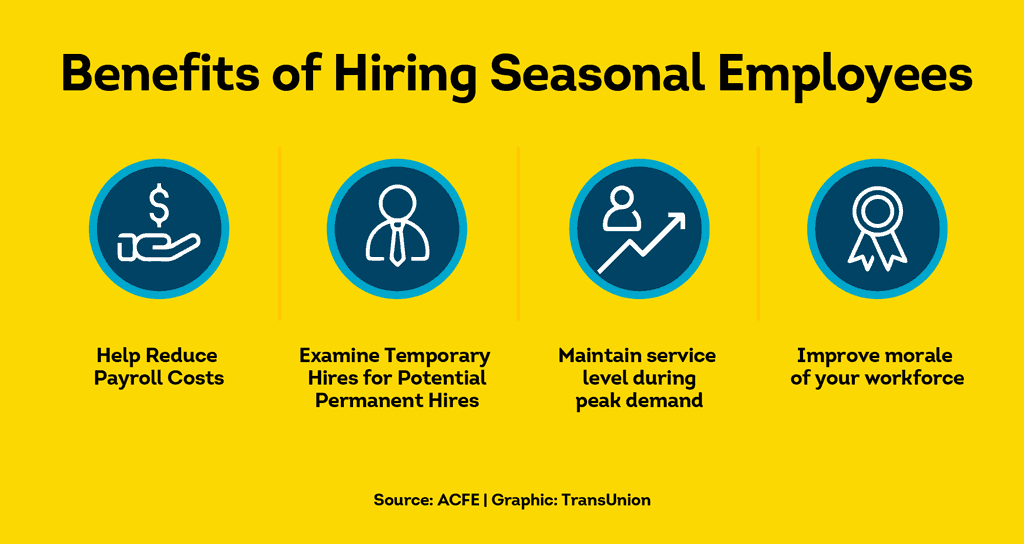
1. Help Reduce Payroll Costs
Small business owners often spend a huge chunk of revenue on employee payroll. In fact, according to the U.S. Department of Labor, employees cost employers over $40/hour on average in 2024. However, seasonal employees may help reduce that overall cost. With seasonal employees, you’ll typically only incur payroll costs when you have employees on your roster.
If your seasonal employees are hired for part-time positions, then they may not work enough hours to constitute overtime pay. This may further reduce the money business owners must shell out for qualified employees.
Pro Tip: Smart hiring isn’t the only way to get more bang for your buck. These tax filing tips for small businesses could help you save more during tax season.
2. Examine Temporary Hires for Potential Permanent Hires
Seasonal hires are usually brought on with an anticipated employment end date. However, you might decide to extend a full-time job offer once their employment term is complete. You may want to consider seasonal hiring as a lower-stress method to help you determine if someone would make a great addition to your full-time team.
Ask yourself questions like the following to gauge if a seasonal employee fits your business:
- Does this person work well with other employees?
- Does this person provide exemplary customer service?
- Does this person contribute to daily productivity?
- Does this person learn quickly?
Sometimes, seasonal employment offers employers the unique opportunity to examine temporary hires and spot the qualities of a great hire in action.
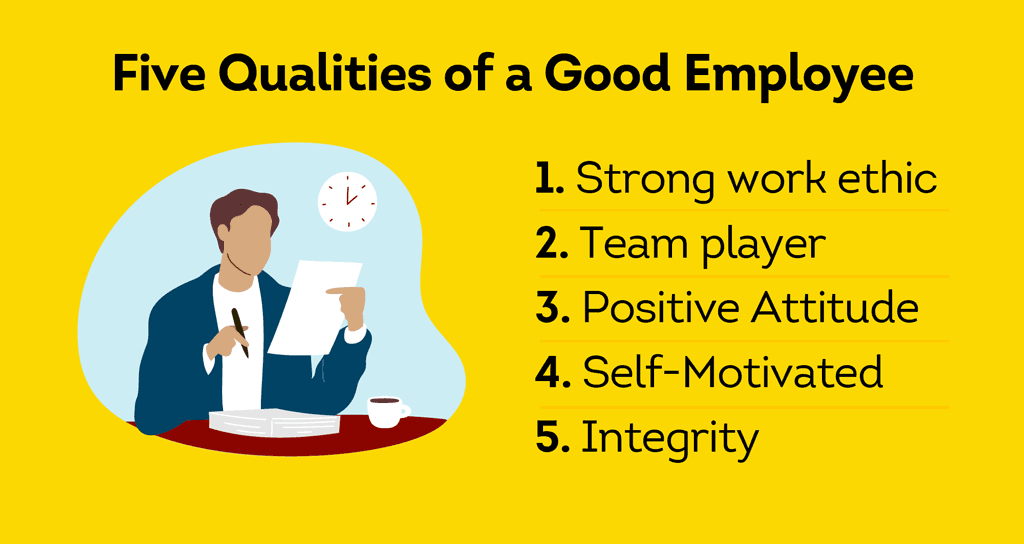
3. Maintain Quality During Peak Demand
Seasonal hires can be great for small businesses with high demand during certain months. An uptick in customers can leave your current team underequipped. By bolstering your roster with temporary hires, you can provide the same level of customer service, handle increased demand, and help maintain your company’s reputation.
Pro Tip: Your reputation doesn’t just come from current staff and customers. All job candidates can impact how your organization is seen by the world at large. Learn how providing an excellent candidate experience may help improve how job seekers see you.
4. Improve Morale
Seasonal employees provide extra capacity to your current team. Additional help can improve morale during the busy season. When work picks up, employees may feel burnt out more quickly. Providing extra hands to help shoulder some of the increased workload may help keep your current full-time employees engaged and improve employee retention in the long run.
Seasonal Hiring During the Holidays
Many business owners may think of seasonal hiring as exclusive to the holiday months, typically between October and January. It’s true that many seasonal hires are onboarded during this time. Why Holiday spending makes up a significant portion of annual retail sales. In fact, the National Retail Federation reports that American consumers were expected to shell out more than $950 billion on holiday spending in 2023, an increase from previous years and the highest on record.
To keep up with demand, many employers hire part-time employees to help handle the influx of business. While the additional help is needed, employees must also consider the cost of these seasonal hires. Taking on holiday employees is an investment for business owners.
Bottom line: While holiday seasonal employees may mean higher payroll costs, the benefits may be well worth it. The more hands you have on-deck, the better experience you can provide to holiday shoppers.
Seasonal Employees Benefits
Per the Fair Labor Standards Act (FLSA), seasonal hires have equal rights regarding minimum wage, overtime pay, recordkeeping obligations, and hiring age. Seasonal employees are also generally entitled to the same protections as all other employees, including laws governing anti-harassment, anti-discrimination, health, and safety regulations.
The rules governing benefits for seasonal employees vary by state.
Disclaimer: Please consult your legal counsel to get more information on employment laws and to learn more about seasonal employee rights, benefits, and policies in your area.
Hiring Seasonal Employees
Small business owners and hiring managers can streamline the hiring process for seasonal employees by incorporating the following into their hiring checklist:
Write a Job Description Tailored to Seasonal Workers
It’s important to know how to write a clear and attractive job description whether you’re hiring seasonal or permanent employees. An effective ad should target the type of hire you’re hoping to make.
Make sure to:
- Clearly state that it’s a seasonal position within the title and text of the description. Otherwise, you may waste valuable time wading through applicants in search of a permanent position.
- Include the expected start and expected end date so that your applicants know what to expect.
Providing all necessary information upfront may help you narrow down your pool of applicants. This helps to ensure that only those looking for seasonal employment apply.
Hire Seasonal Employees Early
Hiring the right employee can be a lengthy process. It can take longer than you might think (sometimes more than 30 days) for small business owners to fill an open position—even a temporary role. With that hiring timeline in mind, start early.
When do employers hire seasonal employees Recently, there’s a trend of filling summer positions by April or May each year, while winter positions are being filled as early as August.
Start your search with plenty of wiggle room. Allow time for employee screening. If you rush the process, you may end up hiring the wrong employee.
Pro Tip: Do you know how long employee background checks take It can vary from a few minutes to a few weeks. Read the full article to learn how to get faster background checks to help you hire more quickly.
Conduct Background Screening
Seasonal hires may only be with your company for a few weeks, but their impact can remain for a shockingly long time. A potentially destructive employee can create an unsatisfactory working environment, causing others to quit.
Rude behavior and incompetence may also cause otherwise loyal customers to leave in droves. On top of that, potential negligent hiring lawsuits could shutter your business with massive legal costs and headache.
Potentially devastating consequences can haunt small businesses years after an ill-fitting seasonal employee departs. That’s why it’s crucial to vet every hire, regardless of employment length.
Consider including online background checks on all seasonal hires. Employee screening may help:
- Maintain Team Productivity: A bad hire, no matter how long they’re with your company, can affect the work output of those around them. A single “toxic” employee may damage your company’s bottom line.
- Protect Your Business: According to recent research from Jack L. Hayes International, Inc., 18% or survey participants admitted to stealing from their employer in 2022, and the average value of theft was $1,136.
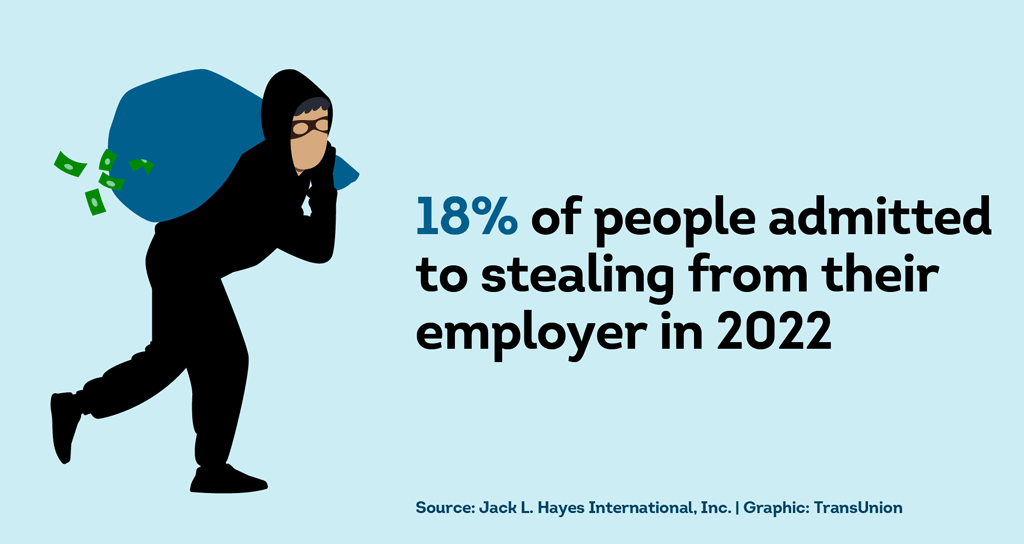
- Expedite Seasonal Workers Becoming Employees: If you decide to hire seasonal workers onto your permanent roster, you’ll want to ensure you’ve vetted them. Put them through the same employment screening that other full-time employees have completed.
Create an Onboarding Program
All employees, including seasonal hires need effective and efficient onboarding to feel comfortable and perform well in their roles. Organizations with a standard onboarding process may experience greater new-hire productivity.
According to job site Indeed, new hires typically have dozens of required tasks they must complete. These include things like:
- Signing documents
- Completing admin tasks
- Filling out tax paperwork
- Setting up technology
- Getting log-ins, passwords, and programs
- Achieving goals related to learning the company culture and marketplace.
To help set your seasonal hires up for success, ensure your onboarding processes are efficient.
What to Do with Seasonal Hires When Your Busy Season Ends
When the busy season ends and temporary hires are preparing to leave, there are a few steps employers should take.
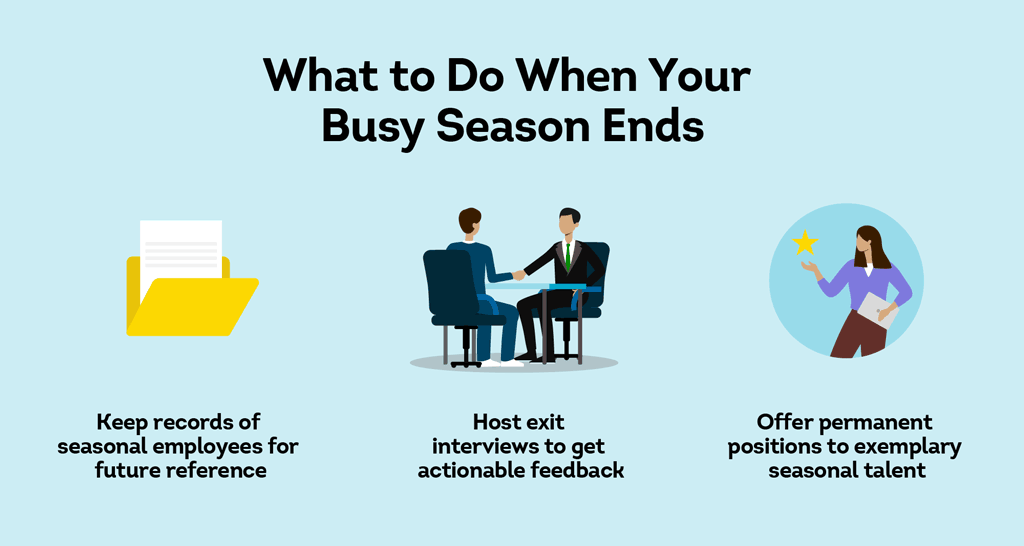
1. Keep Organized Records
If you part ways with your seasonal hires after the rush is over, don’t completely lose contact. If they were good, you may want to call on them for help during the next busy season.
Keep each hire’s name and contact information with your existing employee records. Then, mark down whether you’d like to invite them back in the future.
2. Host Exit Interviews
Treat your seasonal employee’s departure in the same manner you would a permanent hire. Exit interviews can help you get insights into your business operation and may highlight areas that need improvement.
As you’ll likely hire seasonal employees on a recurring basis, understanding how to better manage these types of employees can help your business in the long run. Here are a few basic exit interview questions you might consider asking:
- What did you like most about your job
- What would you change about your job, your team, or the company as a whole
- Were you given the tools to succeed at your job
- Were you comfortable talking to your manager about work problems
- Did you feel you were kept up to date on new developments and company policies
- If you had a friend looking for a job, would you recommend us Why or why not
Pro Tip: Besides exit interviews, there are several additional things you should do when an employee quits.
3. Consider Bringing on Permanent Talent
While you may hire with the intention of saying goodbye at the end of your busy season, the best employees can be tough to come by. If you find that some of your seasonal hires could be great employees, consider bringing them on as permanent talent.
Hiring from your seasonal worker pool can help you reduce time and money spent on future employee recruitment and improve your employee retention rates in one go.
It’s Always Screening Season with ShareAble for Hires
Hiring seasonal employees can be a helpful way to meet the demand brought by changing seasons. However, just as spring means exciting potential for new growth, it can also mean unexpected storms for unprepared small business owners.
Don’t get caught in the deluge caused by potentially ill-fitting seasonal hires. Conduct quick, efficient pre-employment screening through ShareAble for Hires.
Designed specifically for small business owners, ShareAble for Hires provides fast, online employment background checks, so you can get the information needed to help make more confident hiring decisions.
Seasonal employees may be with you for only a short time, but any ill-fitting hire’s impact can last long after they leave. It’s imperative to know exactly who you’re hiring with helpful reports, including:
- Identity verification: Help ensure your seasonal job applicant is who they say they are.
- Credit checks: Reports may include information such as employment history, level of debt, accounts sent to collections, and previous residences
- Criminal background checks: Help keep permanent employees, clients, and customers safe by checking your applicant against millions of federal and state-level crime records from dozens of law enforcement agencies.
Employment screening seasonal help is essential, but it doesn’t have to be time consuming. With ShareAble for Hires, you can get snappy screening results, meaning you may be able to interview, screen, and potentially hire temporary workers on the same day. Simply create a free account to get started.
Just like spring, seasonal staffing needs can bring out the weeds, along with the roses. Help ensure your business is ready to thrive with seasonal employee screening through ShareAble for Hires.
ShareAble for Hires
Sign-up Now. Reports Now. Hire Now.


